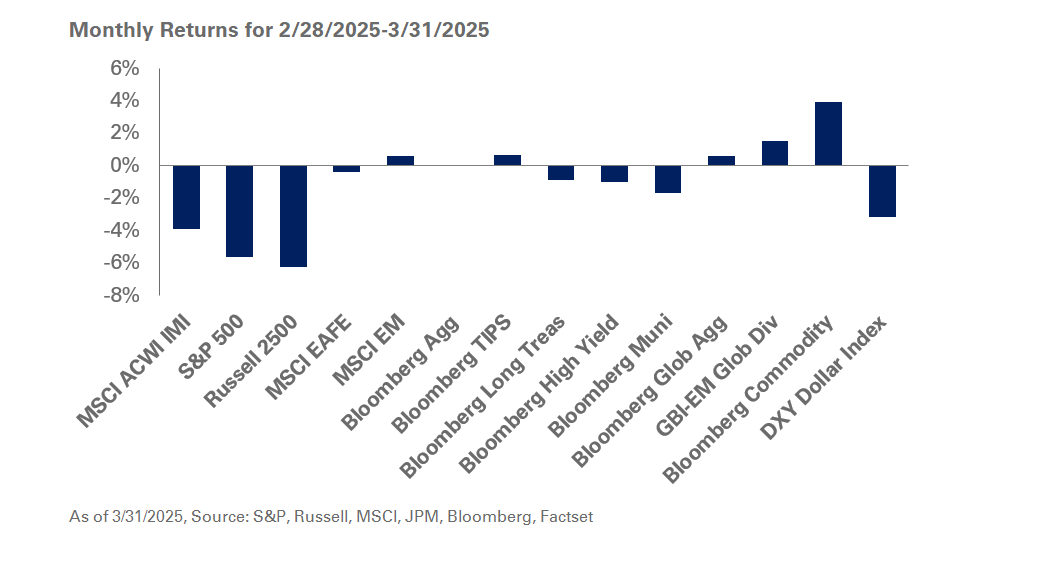NEPC Market Outlook highlights our investment views and recommendations, while examining the key influences driving capital markets.
Russia’s invasion of Ukraine—seemingly unfathomable in this day and age—has shocked the world order, resetting the geopolitical landscapes for years to come. Its aggression is an appalling act of cruelty and, sadly, the humanitarian crisis is likely to escalate as Russian attacks on Ukraine’s urban centers intensify.
Unfortunately, our hopes are inadequate in the face of this assault and the reality unfolding on the ground in Ukraine. As we watch in dismay, we are assessing the potential outcomes of the crisis and see the cessation of military conflict aligning with these potential outcomes: the rise of a new Iron Curtain, with Russia holding territory across Eastern Ukraine and Crimea, a withdrawal of Russian troops from Ukraine, or a regime change in Russia.
We are also monitoring the potential impact of the Russia-Ukraine crisis on our clients’ investment portfolios and capital markets. We expect near-term volatility to remain elevated and are mindful of the potential disruptions to energy prices and global supply chains. We believe it is fair to assume Russia will be un-investable for the foreseeable future with no clear path to its reintegration into the global economy. At present, major asset classes have adjusted to the tumult with gold and the U.S. dollar rallying, stocks trending lower, and credit spreads widening. So far, the markets reflect above-average volatility and are yet to exhibit persistent price disruptions. In the event of meaningful price dislocations in U.S. equities, we encourage investors to be prepared to act as we continue to view U.S. large-cap stocks—particularly the value segment—favorably.
Although Russia plays a relatively minor role in global capital markets, it wields significant clout as a commodity exporter, heavily influencing global supply chains. It is the world’s second biggest exporter of oil, the largest exporter of natural gas, and a substantial producer of key industrial metals such as aluminum and palladium. The levying of financial and economic sanctions has largely removed Russia from key global supply chains. As a result, we are likely to see significant pressure on energy prices and key commodity inputs, and higher inflation in the absence of alternative sources of supply.
While supply constraints around global energy and industrial metals are concerning, more worrisome is the potential for food insecurity in North Africa, the Middle East, and some European nations. Russia and Ukraine represent over a fourth of the world’s wheat exports, but also the bulk of these grain exports travel through ports in the Black Sea where access is now jeopardized. While higher food inflation is likely in the coming months for many consumers, food insecurity and supply shortages can stress political stability in many countries, potentially inflaming geopolitical hotspots across the globe.
As inflation and supply pressures build in the near term, we are keenly monitoring the potential impact on economic growth rates. We are mindful of the potential disruption to consumer spending, especially if energy prices keep escalating. In the past, extreme surges in oil prices have impacted discretionary consumer spending and ratcheted up the risk of an economic recession. That said, there are reasons to believe the price point for oil to materially reduce consumer activity is higher than in the past because of increased fuel efficiency and a greater prevalence of economic sectors that are less dependent on energy. Still, as a precaution, we encourage investors to maintain a dedicated safe-haven fixed-income allocation to provide downside protection and liquidity in times of market stress.
For the duration of military conflict, we expect volatility to remain elevated and we believe investors will be well served to remain disciplined as near-term uncertainties related to geopolitical, inflation and growth outlooks flow through long-term strategic portfolio positions. We will continue to provide updates as the Russia-Ukraine crisis evolves and our investment views shift. Please contact your NEPC consultant for any questions you may have.



